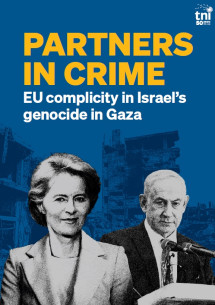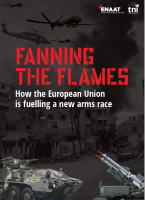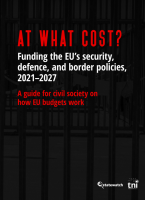Partners in Crime EU complicity in Israel’s genocide in Gaza
Since the attacks of 7 October, the EU has provided political cover and material support for Israel. This has continued through almost eight months of unrelenting bombardment with almost 40,000 people killed, the forced displacement of 2.3 million people, the fastest descent into starvation of an entire population ever recorded and the total destruction of Gaza’s civilian infrastructure including homes, hospitals, schools and universities, places of worship and bakeries. This support continued as Israel was placed on trial for genocide at the International Court of Justice (ICJ) in The Hague and as the International Criminal Court (ICC) announced that it would seek arrest warrants for Israel’s prime minister Benjamin Netanyahu and defence minister Yoav Gallant. Were the EU to have applied pressure in October by imposing sanctions, an arms embargo and prohibiting the transit of US military equipment through Europe, Israel’s genocidal war on Gaza may have been curtailed. The EU chose not to act then, and it continues to fail in its legal and moral duty to act now. This political cover and material support, particularly in light of the ICJ’s interim ruling which put all states on notice of a plausible case of genocide, makes the EU directly complicit in it.

Downloads
Authors
Summary
At the time of writing people across the European Union (EU) were preparing to vote in the European Parliament elections against the backdrop of Israel’s genocidal war in Gaza, in which the EU is complicit.
Since the attacks of 7 October, the EU has provided political cover and material support for Israel. This has continued through almost eight months of unrelenting bombardment with almost 40,000 people killed, the forced displacement of 2.3 million people, the fastest descent into starvation of an entire population ever recorded and the total destruction of Gaza’s civilian infrastructure including homes, hospitals, schools and universities, places of worship and bakeries. This support continued as Israel was placed on trial for genocide at the International Court of Justice (ICJ) in The Hague and as the International Criminal Court (ICC) announced that it would seek arrest warrants for Israel’s prime minister Benjamin Netanyahu and defence minister Yoav Gallant.
Even amid Israel’s most recent and particularly barbaric attack on a makeshift refugee camp in Rafah, in which at least 45 people, mostly children, were burned alive in tents, the EU did not waver. The following day European Commissioner Olivér Várhelyi touched down in Tel Aviv on an official EU visit saying he was ‘honoured’ to meet Netanyahu. He also met President Herzog, Foreign Minister Israel Katz, and Defence Minister Yoav Gallant.
The tone of the EU’s support for Israel was set when European Commission President Ursula von der Leyen tweeted a photo of the European Commission building in Brussels lit up in an Israeli flag. She pointedly said ‘Israel has the right to defend itself – today and in the days to come. The European Union stands with Israel’. In doing so she gave Israel a green light to begin its military campaign on Gaza with EU approval. In the eight months since, the EU has failed to take any concrete steps, such as implementing sanctions, an arms embargo, or cutting diplomatic and trade ties. Its response has been purely rhetorical, and extremely poor at that, at times shamefully repeating Israeli propaganda. For months the European Council wrangled over whether to call for a ‘pause’, ‘pauses’, ‘window’, ‘windows’ or a ceasefire until finally in March 2024, by when over 30,000 people in Gaza had been killed, it called for ‘an immediate humanitarian pause towards a sustainable ceasefire’. The European Parliament was marginally faster than the Council having called for a ceasefire three weeks earlier at the end of February, but the following day amidst devastating scenes of a massacre in which Israeli soldiers killed over 117 Palestinians as they desperately scrambled for aid, the Parliament overwhelmingly voted down a resolution calling for an arms embargo.
For decades, the EU has maintained close ties with Israel, treating it as a de facto EU member state, even as it expanded its illegal military occupation of Palestine and frequently invaded and waged war in neighbouring territory. It is unsurprising therefore that the EU has failed to hold it to account now. Although relations between the EU and Israel are governed by the EU Israel Association Agreement which contains a human rights clause, the EU has consistently refused to invoke this stipulation. Not only has the EU failed to abide by its own norms, which compel it to break ties with Israel on account of human rights violations, it has also actively maintained relations over the past eight months by approving funding for Israeli entities and fostering closer ties with the Israeli state and institutions. For all its talk of human rights, the EU has shown itself to be every bit as colonialist now as various European powers were for centuries. It is only possible to understand the EU's abject failure to intervene in the face atrocities and an avalanche of human suffering unparalleled in recent history if viewed through the lens of colonialism. Israel began as a colonial project and it continues to be a colonial outpost today.
The EU has enabled and normalised a genocide by adopting a ‘business as usual’ approach to Israel and its closest ally, the US, particularly by continuing to allow US arms shipments bound for Israel to transit through European territory.
Were the EU to have applied pressure in October by imposing sanctions, an arms embargo and prohibiting the transit of US military equipment through Europe, Israel’s genocidal war on Gaza may have been curtailed. The EU chose not to act then, and it continues to fail in its legal and moral duty to act now. This political cover and material support, particularly in light of the ICJ’s interim ruling which put all states on notice of a plausible case of genocide, makes the EU directly complicit in it.
Key findings
The EU and Israel have adopted a ‘business as usual’ attitude throughout the ongoing genocide in Gaza, with the EU, and its member states, continuing to provide political cover and material support.
Since 7 October 2023, the EU has approved 130 Horizon Europe research projects involving Israeli participants, which have received a total of €126 million. The overall value of these projects is much larger. At least two of these projects directly fund the Israel Aerospace Industries (IAI), one of Israel’s largest arms companies, which is in receipt of almost €640,000. Two other projects directly fund Israel’s Ministry of Health, which has received €983,775.
Most of the Horizon Europe funding is going to Israeli universities, which are often close partners of Israel’s military and arms industry, at a time when every university in Gaza has been bombarded and destroyed. Moreover, many of the projects fund innovative medical research at a time when Israel has laid siege to Gaza’s hospitals and ransacked its health facilities leaving hundreds of bodies in multiple mass graves on hospital compounds.
By way of example, under the Horizon Europe programme there is one project that involves an Israeli entity that works alongside the Israeli military conducting ‘war games and simulations’. This project, titled EU-GLOCTER, is worth a total of €2.6 million and is coordinated by Dublin City University in Ireland involving a collaboration with various partners including Israel’s Reichman University and Counter-Terrorism Solutions Ltd. Other projects are similarly problematic and involve funding for surveillance, digital advances and technology – this at a time when Israel is waging a war that is highly dependent on high-tech digital war tools.
For some time, the EU has been directly funding arms companies under two specific funds – the Act in Support of Ammunition Production (ASAP) worth €500 million and the European Defence Fund (EDF) worth €8 billion. Private, and highly lucrative, arms companies that are currently in receipt of European public money to the tune of €426 million are arming Israel. The funding allocated under the ASAP, €229 million, almost half of the total amount, was approved after 7 October 2023. The German company Rheinmetall, which is sending tank shells to Israel, has received over €133 million under the ASAP and over €36 million under the EDF. Norwegian company Nammo, with subsidiaries in other Nordic countries, which is arming Israel with bunker defeat munitions, a shoulder fired ‘bunker buster’ rocket, has received over €96 million under ASAP and a subsidiary company has received €27 million under EDF. Other European arms companies in receipt of European public money that arm Israel include Leonardo, in receipt of almost €115 million, ThyssenKrupp, over €1 million, Rolls Royce, €600,000, BAE Systems €500,000 and Renk over €420,000.
For years the European and Israeli arms industries have been deeply enmeshed, with trade between the two being mutually beneficial.
EU member states also contribute significantly to Israel’s military might, both in terms of developing its own arms industry and in building its military strength. Germany is Israel’s second-largest arms supplier after the US, with arms export licences worth €0.88 billion between 2018 and 2022. This accounts for half of the EU’s arms exports over this period. In 2023 German exports to Israel increased tenfold from €32.3 million to €326.5 million with the vast majority of new licences being granted in the period following 7 October.
After Germany, Romania, France, Italy, the Czech Republic and Spain (in order of decreasing value) were the EU’s largest arms exporters to Israel. The UK’s total export value was €167 million but since Brexit it is only partially included in the EU’s total arms export value, which was €1.76 billion from 2018 to 2022.
Some large arms exports that took place in the years covered in this research – 2018–2022 – from European countries to Israel can be directly connected to the current war on Gaza, such as engines for Merkava tanks and Namer armoured vehicles (MTU – Rolls-Royce subsidiary, Germany), Sa’ar corvettes (Thyssenkrupp Marine Systems, Germany), naval guns (Leonardo, Italy) and howitzers (BAE Systems, UK).
At least 25% of components for spare parts directly exported to Israel for the upkeep of F-35 fighter jets, currently being used to bomb Gaza, come from European countries including Belgium, Denmark, Finland, Germany, Italy, the Netherlands, Norway, Switzerland and the UK. Only the Netherlands has placed restrictions on these exports following a case brought before the Dutch courts by civil society groups, which was won on appeal.
In total, EU countries denied 20 arms export permits for Israel between 2018 and 2022, mostly for firearms. The governments which issued the denials are not named.
As well as exporting directly to Israel, components manufactured by EU member states that are exported to the US will often end up in weapons systems that the US then exports to Israel. This happens because the US does not allow other countries to have a say over its arms exports, meaning that there are no end-user agreements between EU member states and the US. Moreover, open or general licences, as opposed to one for each export, or categorising goods as dual-use as opposed to solely for military use, allow states to export more easily and circumvent regulations.
Israel’s arms industry fosters close ties with the IDF and Defence Ministry and regularly markets its products as ‘battle tested’. The EU legitimises this marketing strategy by purchasing these products.
Israel was the world’s tenth-largest arms exporter for the period 2018–2022, by far the largest per capita, with roughly 25% of these exports going to European countries. German was by far the highest importer and drones are one of the best-selling products. The EU’s border and coast guard agency, Frontex, leases drones from Elbit and IAI for surveillance flights. Elbit has subsidiaries in 11 European countries including Austria, Belgium, France, Germany, Hungary, Italy, the Netherlands, Romania, Sweden, Switzerland and the UK.
Several EU and other European countries – including France, Germany, Greece, Italy, the Netherlands, Poland and the UK – participate in military cooperation with Israel, for example with joint military exercises, training or information and intelligence exchange. Israel is also a close partner of NATO and since 2017 it has a permanent and official mission to NATO’s headquarters in Brussels.
In 2018 Europol signed a working arrangement with the Israeli law enforcement authorities – including the Israel National Police and the Israel Security Agency, which are involved in the current war on Gaza – on fighting serious crime and terrorism, through exchange of information, knowledge and best practices, participation in training activities and advice and support in investigations. In September 2022 the EU and Israel completed negotiations for an additional personal data-sharing agreement between Europol and Israeli law enforcement. In December 2022 the EU froze further steps to adopt the treaty, because of the anticipated policies regarding the West Bank.
The closest form of security cooperation between EU and Israeli entities takes place in the field of research and innovation (R&I). Israel has been associated with the Framework Programmes, the overarching EU funding instrument for R&I, since 1996. Since 2007, under Framework Programme 7, Horizon 2020 (2014–2020) and Horizon Europe (2021–2027), so far 84 of them have earned €69.39 million from 132 security projects.
In respect of energy agreements, in 2022, the EU, Egypt and Israel signed a Memorandum of Understanding (MoU), which saw the EU import gas from Israel via Egypt. In a response to a parliamentary question on the matter, European Commissioner on Energy Kadri Simson confirmed on 12 January 2024 that until the end of November 2023 the EU had imported 1.3 bcms of LNG under the terms of this MoU. Moreover, on 29 October 2023, Israel’s Ministry of Energy awarded licences to six companies for gas exploration in Gaza’s maritime area, including Italy’s Eni S.p.A.
In September 2023, an MoU was signed between the EU, France, India, Italy, Saudi Arabia, the United Arab Emirates (UAE) and the US, for the India Middle East Europe Economic Corridor (IMEC) project. Since 7 October France appointed a special envoy to oversee the project and the Greek Prime Minister stressed its importance. European Commission President Ursula von der Leyen has also continued to endorse the project even amidst Israel’s genocidal war on Gaza. Separately, a Tel Aviv rail-link project received €250 million from the European Investment Bank in December 2023, over two months after Israel’s genocidal onslaught on Gaza had begun.




